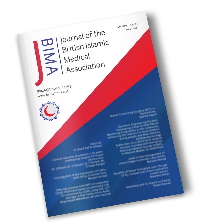
Qureshi H(1), Javaid F(2), Yaqoob Z(3), Abdul-Razakq H(4), Wiley E(5)
1-GP ST3, Portland Medical Practice, Lincoln. 2-Ophthalmology SHO. 3-Medical student, University of Nottingham 4-Trainee clinical science, Poole Hospital, Poole. 5-Microbiology consultant,
Abstract of poster which was presented at the BIMA National Conference , Birmingham 7th December 2019
Since 2007 all NHS healthcare professionals must perform clinical duties ‘Bare Below the Elbows’ (BBE). This causes difficulty for some Muslim female healthcare professionals who feel it is inconsistent with Islamic guidance on dress code. The Department of Health revised its guidance in 2010 to account for ‘cultural issues associated with workwear’. This included suggestions such as uniforms to have three quarter length sleeves, full length sleeves when staff are not engaged in direct patient care activity or disposable over-sleeves. Suggestions were summarised in Appendix B of the guidance. This audit measures how many trusts are incorporating this revised guidance into their uniform policy.
33 uniform policies were collected utilising 2 methods – an internet search engine to locate publicly available policies and the use of British Islamic Medical Association networks to improve coverage. They were then analysed using the criterion ‘Does the uniform policy incorporate recommendations from Appendix B of Department of Health’s Uniform and workwear guidance?’ An internal standard was set at 90%.
Of the 33 policies reviewed, only 9 stated alternatives to BBE should be provided (27%) and of these, only 7 trusts said disposable sleeves could be provided by the hospital.
The majority of trusts have not incorporated the revised guidance on BBE into their uniform policies leaving them open to scrutiny. Greater awareness is required of this issue and trusts need to be encouraged to revise policies in line with the 2010 Department of Health guidance.
BIMA has also produced toolkits to educate Muslim female healthcare professionals at the grassroots level with the knowledge and resources needed to approach infection prevention teams and request amendments to policies if necessary. We intend to re-audit to assess the impact of our toolkits in 3 year’s time.

